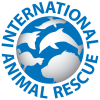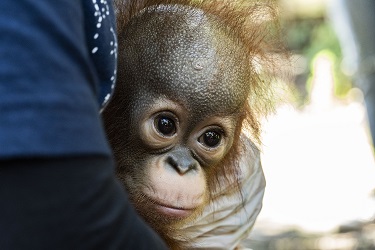
Tiny baby orangutan is rescued in West Borneo.
UNITED KINGDOM / AGILITYPR.NEWS / April 22, 2020 / Tiny baby orangutan is rescued in Borneo.
In spite of the COVID-19 pandemic, protected primates are still being illegally taken from the wild and kept as pets.
Photos and videos of the rescue, copyright IAR Indonesia.
https://www.dropbox.com/sh/y3wu8zbxgrb4bw8/AACa2X03Tns1sVG3xpm5ttkma?dl=0
In the midst of the COVID-19 outbreak which is believed to have originated from wildlife, in Indonesia there is clear evidence that people are still keeping protected wildlife as pets. This practice is not only illegal, it also increases the risk of disease transmission from animals to humans and vice versa. Direct contact with wildlife risks spreading a variety of serious diseases, not only to the person keeping the animal but also to other people with whom he is in contact.
On Friday 17 April members of the Natural Resources Conservation Centre (BKSDA) in Ketapang, West Borneo, together with a team from the Indonesian arm of International Animal Rescue (IAR) rescued a baby orangutan from Sabang Keramat Hamlet, Batu Lapis Village, Hulu Sungai District, Ketapang Regency.
The little male orangutan had been kept for the past three months by a man named Bumeng. He claimed that he had found the baby orangutan alone on the edge of the forest after hearing a strange noise in the forest where he worked. Out of curiosity, he searched for the source of the sound and found a baby orangutan all alone without its mother. After waiting for several hours, at the end of which time the mother orangutan hadn’t appeared, Bumeng decided to take the baby home with him.
Bumeng put the baby orangutan, which he named Batis, in a tiny wooden cage measuring 80x80x50cm (31x31x20”.) He fed him on white rice, papaya and sugar cane and gave him coffee and water to drink. Batis spent three months in the wooden crate without ever being taken out. Food and drink were put into the dirty wooden box. Keeping pets illegally with no regard to the cleanliness and welfare of the animals can also contribute to the potential emergence of diseases.
An immediate medical examination by IAR Indonesia’s vet suggested that Batis was about six months old and, considering his circumstances, was in relatively good condition. He wasn’t displaying any abnormal symptoms or dehydration. He was transported to IAR Indonesia’s Orangutan Rescue and Conservation Centre in Sungai Awan, Ketapang and placed in quarantine. The quarantine period will last for eight weeks and during this time he will be given regular thorough veterinary checks to ensure that he isn’t carrying any infectious diseases that could be transmitted to people or other orangutans at the centre.
IAR Indonesia Programme Director, Karmele L Sanchez emphasised: "The keeping of wild animals as pets should no longer happen. In addition to threatening the preservation of wildlife, irresponsible behaviour like this also risks endangering humans with diseases that may be carried by wildlife.
“It is time to stop keeping wild animals captive, both orangutans and other animals that should remain in the forest. People who find or see orangutans and other wildlife in a place where they don’t belong should immediately report it to the authorities. We don’t even know for certain yet whether this virus is carried by wild animals and then transmitted to humans. But if people do not want to cooperate by surrendering a captive orangutan, then the law should be strictly enforced because it is no longer just an issue of species conservation or welfare of the animals, but also an issue of human health on a global scale.”
Sadtata Noor Adirahmanta, Head of the West Kalimantan BKSDA, said: "Most people already understand that orangutans are protected animals and keeping them is an act that violates the law. But apparently there is still room for improvement in the public's understanding when it comes to surrendering an animal to the authorities. Some mistakes happen with the discovery of wildlife by people living on the edge of the forest which actually is still the animals’ habitat or home range. In such cases the public should be reminded that the wildlife is within its habitat and should left alone. Options that can be taken include driving the animal back into the forest. And of course, if necessary, experts or the local authorities can be called in. But it certainly isn’t right to capture, keep and then subsequently hand over an animal to the authorities."
Alan Knight, Chief Executive of International Animal Rescue, added: “There is no good reason for keeping an orangutan as a pet. Now that Batis is in our care, he will have the chance one day to return to the wild, rather than living for years in a dark crate, far from his home in the rainforest. IAR Indonesia carries out extensive outreach into rural communities but there is always more work to be done in terms of teaching local people why they should not keep an orangutan as a pet, including the potential risk to their own health.”
For further information please contact Lis Key at IAR on 07957 824379.
www.internationalanimalrescue.org/orangutan-sanctuary

Baby orangutan Batis rescued by the West Kalimantan Natural Resources Conservation Centre (BKSDA) and IAR Indonesia.
About Us
At International Animal Rescue we not only save animals from suffering, we also rehabilitate and release them back into the wild and work to protect their precious natural habitats. Our work includes cutting free and caring for captive bears in India and Armenia, rescuing and rehabilitating orangutans and other primates in Indonesia and treating injured and orphaned howler monkeys in Costa Rica. Our aim is to return animals to their natural environment wherever possible, but we also provide a permanent home for those that can no longer fend for themselves.
As human populations expand, wildlife comes under increasing threat. By rescuing individual animals belonging to species like the orangutan and reintroducing them into protected areas in the wild, our work also plays a role in the conservation of the species as a whole.
Contacts
Lis Key
Media and Communications
lis@internationalanimalrescue.orgPhone: +44 7957 824379 Mobile: +44 7957 824379
www.internationalanimalrescue.org